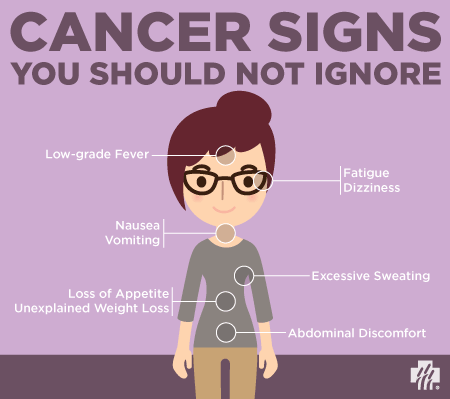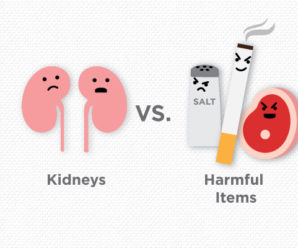 Paying attention to changes in your body can help detect cancer along with regular health screenings.
Paying attention to changes in your body can help detect cancer along with regular health screenings.
It’s easy to dismiss fatigue, persistent cough and constipation as minor health problems and wait for them to go away. Don’t ignore these symptoms. They could be cancer signs.
Before you panic, remember these symptoms most often are signs of less serious illness. Your doctor can treat you and get you on the path to better health.
In the unlikely event you have cancer, early detection increases chances for successful treatment and cure, said Dr. Isaac Yeboah, a Marshfield Clinic oncologist/hematologist.
Vague symptoms present in many cancers
Cancer signs aren’t always contained to the site of the disease. Patients may have vague symptoms that affect multiple body systems including:
- Fatigue
- Excessive sweating
- Low-grade fever
- Loss of appetite
- Nausea
- Vomiting
- Abdominal discomfort
- Unexplained weight loss
- Dizziness
“If you have one symptom or your symptoms last a couple days, that doesn’t mean you have cancer,” Yeboah said. “Symptoms tend to add up and go on longer when you have cancer.”
Persistent cough or coughing up blood
Persistent cough that doesn’t go away after treatment for a respiratory tract infection could be a sign of lung cancer. Coughing up mucus streaked with blood is more concerning, Yeboah said. Seek medical attention immediately if you’re coughing up blood.
Changes in bowel habits
If you previously had healthy bowel movements, these unexplained changes in bowel habits could be signs of colon cancer:
- Diarrhea or constipation consistently or on and off for several weeks
- Blood in your stool
- Any of these symptoms accompanied by abdominal pain that won’t completely go away
Abnormal vaginal bleeding
Women who have gynecologic cancer often report irregular vaginal bleeding. A doctor should check any bleeding or spotting in women who have experienced menopause as soon as possible.
“It can be difficult to tell what’s normal if you haven’t been through menopause and have irregular menstrual periods,” Yeboah said. “Tell your doctor if you experience bleeding between periods on a regular basis.”
Gynecologic cancer sometimes presents with abdominal discomfort, bloating, nausea and excessive gas. These symptoms easily may be attributed to other causes. Talk to your doctor if they persist after treatment for non-gynecologic problems.
See your doctor, but don’t panic
Don’t ignore your symptoms. Talk to your doctor if you have unexplained symptoms that concern you.
“Most of the time, these symptoms aren’t cancer,” Yeboah said. “Cancer may be the most serious consequence. For the small percentage of people who have cancer, we want to catch it early because the key to cancer treatment is early diagnosis.”
Make an appointment for a wellness check.







Leave a Reply